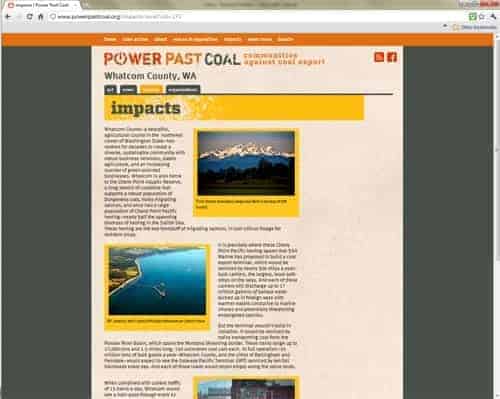The Power Past Coal website was conceived to be a media hub around the coal train issue impacting the Pacific Northwest. For the unfamiliar: the issue is about a coal terminal proposed to be built at Cherry Point in Whatcom County. If built, this would create an enormous influx of trains carrying coal – and with it a tremendous health and economic cost to dozens of communities in as many as five or six states states.
This issue will unfold for years to come. It is complicated — comparatively easy to grasp the enormity of the cost of the coal trains but difficult for an everyday person to know how to invest their time in influencing the outcome. At heart, it is the type of issue that makes people feel helpless and insignificant.
Our solution began with identifying and delivering “actions” as the site’s core purpose. Amazon made a book store where you could be buy a book in a click. OK. We will do the same thing, but we will deliver actions instead of books. The site is an action delivery mechanism, a project management system of sorts.
Our concept began with the idea of utilizing a group of content providers to “broadcast” actions to various counties and states. Each location would be evaluating and prioritizing the actions based on time, importance, and location. We wanted it be as simple as possible, with only three actions for each location, and with the ability to make the action as simple or as complex as they needed.
Of course, a context would be required to make the actions meaningful. Topical news stories, videos, interactive maps, a document library, etc. would be filtered and broadcast using the same local broadcast concept.
The action-oriented site concept helped us think of the site differently, creating an alternative to the more general information-oriented sites out there. Additionally, it created a goal that helped us evaluate and prioritize other features, favoring an “action-oriented” functionality perspective.
As with all websites, PowerPastCoal.org will be an ongoing process of development and refining. We are very happy with the initial version and look forward to helping our community (and others) in Powering Past Coal.

